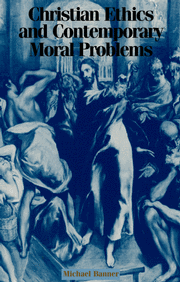Book contents
- Frontmatter
- Contents
- Preface
- Acknowledgements
- 1 Turning the world upside down – and some other tasks for dogmatic Christian ethics
- 2 Christian anthropology at the beginning and end of life
- 3 The practice of abortion: a critique
- 4 Economic devices and ethical pitfalls: quality of life, the distribution of resources and the needs of the elderly
- 5 Why and how (not) to value the environment
- 6 On not begging the questions about biotechnology
- 7 ‘Who are my mother and my brothers?’: Marx, Bonhoeffer and Benedict and the redemption of the family
- 8 Five churches in search of sexual ethics
- 9 Prolegomena to a dogmatic sexual ethic
- Bibliography
- Index
8 - Five churches in search of sexual ethics
Published online by Cambridge University Press: 21 May 2010
- Frontmatter
- Contents
- Preface
- Acknowledgements
- 1 Turning the world upside down – and some other tasks for dogmatic Christian ethics
- 2 Christian anthropology at the beginning and end of life
- 3 The practice of abortion: a critique
- 4 Economic devices and ethical pitfalls: quality of life, the distribution of resources and the needs of the elderly
- 5 Why and how (not) to value the environment
- 6 On not begging the questions about biotechnology
- 7 ‘Who are my mother and my brothers?’: Marx, Bonhoeffer and Benedict and the redemption of the family
- 8 Five churches in search of sexual ethics
- 9 Prolegomena to a dogmatic sexual ethic
- Bibliography
- Index
Summary
As surely as God is faithful, our word to you has not been Yes and No. (2 Corinthians, 1: 18)
Unlike Paul's word to the Corinthians, the word of the House of Bishops of the Church of England in their statement entitled Issues in Human Sexuality certainly seems like Yes and No – or rather No and Yes. For an attempt has been made to balance a fairly traditional approach to the problems of sexual ethics, and thus a fairly traditional critique of homosexual relationships, with a relatively tolerant pastoral policy. Thus, while the Bishops are ‘unable to commend the [homophile] way of life … as in itself as faithful a reflection of God's purposes in creation as the heterophile’, they ‘do not reject those who sincerely believe it is God's call to them’ (5.6) – though in their ‘considered judgment the clergy cannot claim the liberty to enter into sexually active homophile relationships’ (5.17).
In speaking this No and Yes, the Bishops can hardly have expected that their statement would be well received, no matter any merits it may have and no matter that they have spoken in moderate tones and evidently with a genuine pastoral concern. For with this No and Yes and the attempted mediation between two points of view, the statement is surely destined to satisfy the advocates of neither, who would prefer to hear Yes or No as the case may be, but certainly not both.
- Type
- Chapter
- Information
- Christian Ethics and Contemporary Moral Problems , pp. 252 - 268Publisher: Cambridge University PressPrint publication year: 1999



